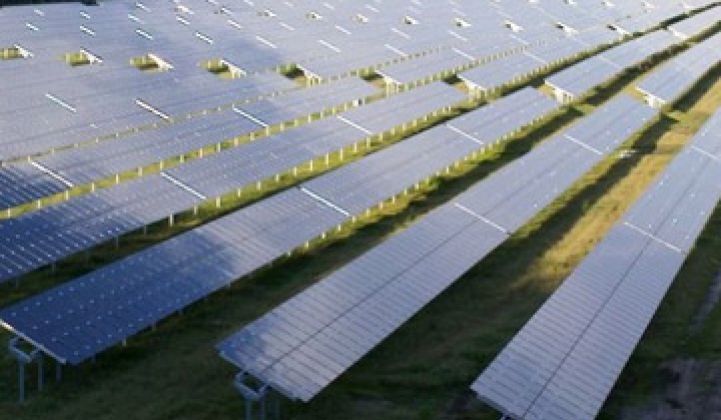Abound Solar's CEO Tom Tiller has told me: "This company has the potential to be the next great solar company."
Abound Solar, a manufacturer of cadmium telluride thin-film photovoltaic solar modules, just officially closed on a long-anticipated $400 million loan guarantee from the U.S. Department of Energy (DOE) to fund the expansion of the company’s manufacturing capacity. The company has also raised an additional $110 million in venture financing, bringing Abound’s equity financing to approximately $260 million since the company’s founding in 2007. Abound Solar’s existing investors, Invus Group, Bohemian Companies, DCM, GLG Partners, and Technology Partners, participated in the equity round. They were joined by new investors BP Alternative Energy and West Hill Investors.
The debt and equity financings will enable Abound Solar to expand manufacturing capacity at its existing facility in Colorado and at a second site in Indiana, which, when complete, will give the firm a total annual module capacity of 840 megawatts. Abound's current capacity is about 65 megawatts.
Abound and its CEO have the daunting challenge of ramping up a cadmium telluride photovoltaic company to confront market behemoth First Solar and China's crystalline solar (c-Si) dragons. Tiller said, "We don't have to be cheaper than First Solar -- we have to be cheaper than the other manufacturers." Tiller described the current situation in c-Si as "a food fight."
The cadmium telluride materials system is not a slam-dunk. It took First Solar a few decades to get it right. Abound's technology is not new, either -- it's based on 15 years of research at Colorado State University's Material Engineering Laboratory. Other solar firms looking into CdTe include PrimeStar, Solexant, Sunovia, Willard & Kelsey, and Xunlight26.
The Loan, The Loan Process, and What Gets Done With the Money
I recently wrote an article on who gets left holding the bag if one of the recipients of a federal "loan guarantee" fails. Several readers insisted that these financial packages provided to the likes of Tesla, Fisker, Solyndra, Abengoa and BrightSource are "loan guarantees" from the government as opposed to traditional loans. Abound's CEO clarifies:
"In essence, it's a loan," said Tiller, adding: "The loan comes from the federal government." It's actually a "series of loans, according to the CEO, "as complex as the U.S. tax code with a seven-year repayment term." It's distributed on a milestone-basis, based "on a hundred milestones," according to Tiller.
The loan application process was a "comprehensive 18-month effort" that called for "a 600-page loan application, a 150-page independent engineering report and countless site visits."
With plans of 840-megawatt capacity, Tiller acknowledges, "There is no way private equity markets would support that level of growth."
"A True Alternative to First Solar"
You can't talk about cadmium telluride (CdTe) solar panels without bringing First Solar into the conversation.
Tiller described First Solar as being "in a dominant position, really the only CdTe supplier" and "in a sole-source" position. Abound now provides an alternative to First Solar with "a need in the market for a successful competitor on the CdTe side."
First Solar's execution and roadmap serve as industry benchmarks. First Solar's module costs are in the neighborhood of $0.77 per watt and the industry-leading firm expects to have 2.7 gigawatts of capacity in place by the end of 2012. Average panel efficiency is in the neighborhood of 11.4 percent. And First Solar is working on the CIGS material system as a possible higher efficiency alternative to CdTe.
First Solar's FS Series 2 Modules put out between 70 and 77 watts of nominal power. Tiller says that Abound is commercially selling panels in the "high sixties, low seventies at about 10 percent efficiency" -- in other words, they are not that far away from First Solar numbers and are gaining fast.
There is a toxicity risk associated with cadmium telluride that First Solar has confronted with a 100-percent take-back program bonded by Swiss Re in the event that First Solar is not around in 20 or 30 years. Abound also has a recycling program.
Tiller claims that Abound's patented technology is dramatically simpler than that used by First Solar. The CEO claims that First Solar uses six different steps in the semiconductor process and that Abound uses one machine. He also claims that his equipment has a 60 percent smaller footprint and a lower cost with their "close space sublimation process."
The Road Ahead
Abound expects to add two more production lines to their existing 65-megawatt line for a total of about 200 megawatts in Colorado by early 2012. The build-out of the 640 megawatt Indiana plant will follow that.
Tiller said, "We're already competitive with the Chinese" with module costs in the $1.25 to $1.50 per watt range. He sees module costs below a $1.00 per watt in the next year and nearing "First Solar territory" once the Indiana factory is running. Abound has a leg up on the CIGS competition in Tiller's view because "CdTe is a known quantity."
Abound has already supplied panels for a 5.6-megawatt installation and Tiller anticipates shipping 30 to 35 megawatts in 2010. He acknowledges that "there is a ton of work in front of us."



